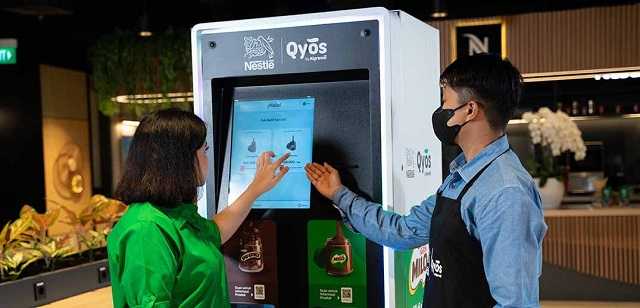JAKARTA, Indonesia – Nestlé is piloting refillable vending machines for Milo and Koko Krunch as part of its efforts to explore novel solutions that help to eliminate the need for disposable packaging. Working in collaboration with the start-up Qyos by Algramo, the innovative machines will be available at two local retailers in Indonesia during a four-to-six-month trial period.
Consumers can bring their own containers, or they can buy provided containers that are available at each of the locations. Through a QR code, they can digitally access product information that is typically found on packaging, such as ingredients, nutritional values and shelf life.
Packaging experts at Nestlé R&D centers in Singapore and Switzerland worked in collaboration with the Nestlé teams in Indonesia, as well as the start-up for the development of the vending machines. Using their expertise, they ensured that the refillable systems maintain the safety and freshness of products across the supply chain, while considering the local context, such as the hot and humid climate conditions in Indonesia.
Gaelle de Mestral, Head of R&D Packaging at Nestlé, says: “We are actively exploring innovative, alternative delivery systems such as bulk, reuse and refill options across several product categories. By undertaking this second pilot for Milo and Koko Krunch, we’ll be able to gain new insights that can be applied to our products, as well further assess the refillable system’s effectiveness in preventing packaging waste along the supply chain.”
In 2021, Nestlé also piloted reusable and refillable containers for Milo, Dancow and Koko Krunch in South Jakarta. Consumers had the option of purchasing the products from tricycle carts fitted with refillable dispensing systems. These findings resulted in valuable insights and now Nestlé will embark on the second phase of the pilot where people can purchase Milo and Koko Krunch in two retail locations.
Samer Chedid, President Director of Nestlé Indonesia says: “Locally, we are pursuing the development of sustainable packaging by launching a second study for the refillable system. We hope that through the Nestlé x Qyos refilling machine technology, we can support the government to encourage people to reduce the use of packaging while also contributing to environmental sustainability goals in Indonesia.”
To address the global issue of plastic packaging waste effectively, collaboration across different sectors is key. Nestlé is actively engaging with start-ups, suppliers and academic institutions to research and develop new packaging materials and solutions. This work is being driven by the Nestlé Institute of Packaging Sciences together the global R&D network to evaluate the safety and functionality of various sustainable packaging materials. The company has already run over 20 pilot tests for reuse and refill systems in 12 countries. This include a recent pilot test for Nesquik reusable containers in Germany in collaboration with start-ups, local retailers and other partners.


















